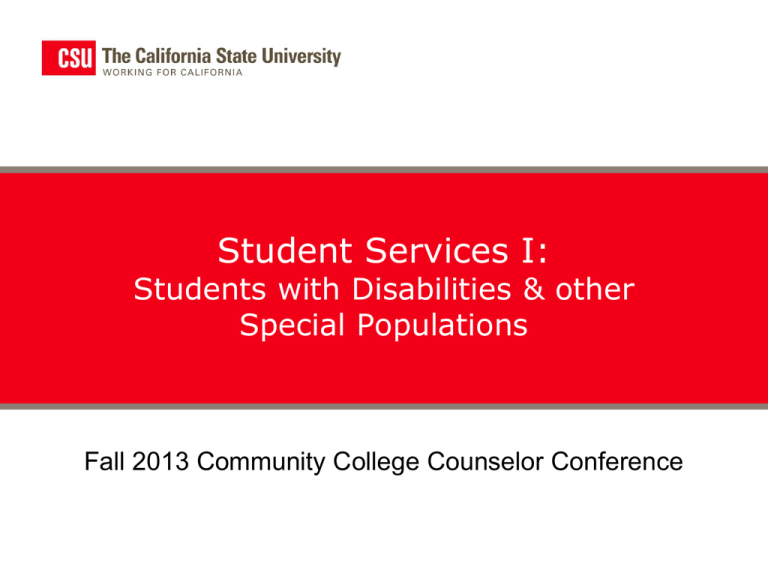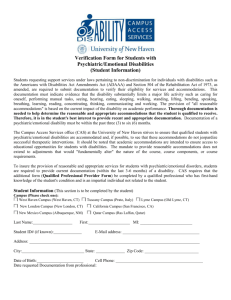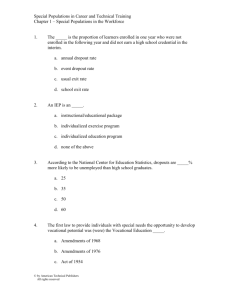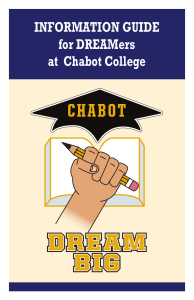Considerations for Students with Disabilities
advertisement

Student Services I: Students with Disabilities & other Special Populations Fall 2013 Community College Counselor Conference Overview Services for Students with Disabilities Special Populations Challenges for Transfer Students Sometimes transferring to a larger institution Academic work becomes more demanding Universal design principles place accommodations across the campus Students assume that policies, procedures, and practices will be the same or similar to their previous institution Things for Students to Consider Disability documentation requirements of the campus – will the current documentation be sufficient? Have prerequisite classes been met – substitutions and/or waivers are not always beneficial later? Does the campus have other support services needed? Accommodations – Case by Case Accommodations are determined by the student’s functional limitations and the academic standards for each class. Extended time to take exams A reader and/or scribe for exams Notetaking Alternative media (Braille, e-text, audio) Assistive technology Peer mentoring & academic coaching Tape recording of classes Accessible classroom furniture Career preparation services Key Messages to Students There are differences in what accommodations are given and how they are applied. Make contact with Disability Services early (so students will know what to expect – informed choice) Register with Disability Services as soon as accepted (early class registration) Do not reveal disability information during application process Additional Information About Services for Student with Disabilities CSUMentor site: – www.csumentor.edu/faq/disabilities.asp California State University site: – www.calstate.edu/SAS/disabilities.shtml Individual campus department websites Special Populations AB-540 Student Requirements – Attended a high school in California for three or more years – Graduated from a CA high school or attained the equivalent of a high school diploma, (Passed the GED or CA High School Proficiency Exam) – Register or be currently enrolled in one of the three state institutions of higher learning – File an affidavit with the college or university stating that he or she has applied to legalize his or her legal status or will do so as soon as he or she is eligible to do so – All information provided by student will be kept confidential by the college or university Special Populations AB-540 Student Eligibility – Any student, except a person in non-immigrant status, who meets the specific requirements shall be exempt from paying nonresident tuition at all public colleges and universities in California Any student means U.S. citizen, legal resident and undocumented person – An undocumented person is a non-citizen who entered the U.S. without legal immigration status or who stayed after the period he/she was authorized to be in the U.S. Special Populations AB-540 Student Eligibility Non-immigrant status means visa holders [e.g., tourist (B visa) or student (F or J visa)] Under AB 1899, students with T (Human trafficking survivors) or U (survivors of serious crimes) nonimmigrant status who meet the other criteria of AB 540 are eligible for in-state tuition, fee waivers, scholarships, institutional and state financial aid Special Populations AB-540 Admission Application Process – Encouraged to apply for admission during the priority filing period (Oct. 1- Nov 30) – The SSN area should be left blank on the Admission Application May use the granted Deferred Action for Childhood Arrivals (DACA) number – The Residency questions should be answered according to their personal residency situation If an undocumented student is charged non-resident tuition but the student knows they meet the AB 540 guidelines, please have the student contact the campus and turn in a California NonresidentTuition Exemption Request Form otherwise known as an AB 540 Affidavit Special Populations Deferred Action for Childhood Arrivals (DACA) – It allows students to work on campus – It does not establish California residency – It does not make students eligible for federal financial aid (no FASFA) – It does not prevent students from applying for California Dream Act financial aid (apply through CalDreamAct.org) – It does not change any AB-540 requirements or eligibility QUESTIONS! www.calstate.edu





